A very special event was held at the Sakya College for Nuns in November 2019. The event was attended by Geshemas and nuns from throughout India and the four schools of Tibetan Buddhism.
At a convocation ceremony, seven Sakya nuns received the Kachupa degree, the culmination of eight years of study. The Kachupa degrees were conferred by His Holiness Sakya Trizin Rinpoche.
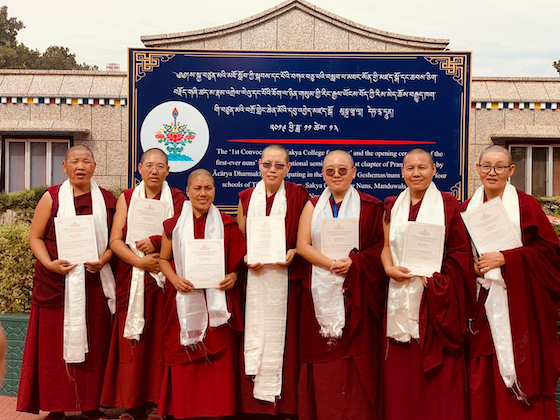
Seven Sakya nuns received their Kachupa Degrees from His Holiness Sakya Trizin Rinpoche at a special convocation ceremony in November 2019.
In addition to the convocation event, the nuns held the opening ceremony of the first-ever Three-Day Nuns Seminar on the First Chapter of Pramanavartikka by Acharya Dharma Kirti. The seminar ran from November 13th to 15th, 2019. Thirty nuns from eight different nunneries and an additional 50 nuns from the Sakya College itself participated in the three-day seminar.
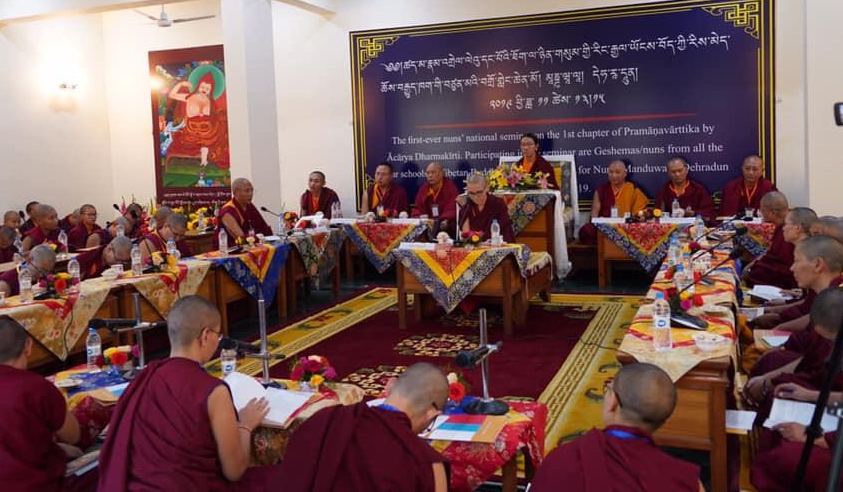
Eighty nuns took part in the first-ever Three Day Nuns Seminar on the First Chapter of Pramanavartikka by Acharya Dharma Kirti held at the Sakya College for Nuns.
Three leaders of the Tibetan Nuns Project were invited to the convocation: Rinchen Khando Choegyal, Founding Director and Special Advisor; Nangsa Chodon, the Director of Tibetan Nuns Project in India; and Dr. Elizabeth Napper, U.S. Founder and Board Chair.
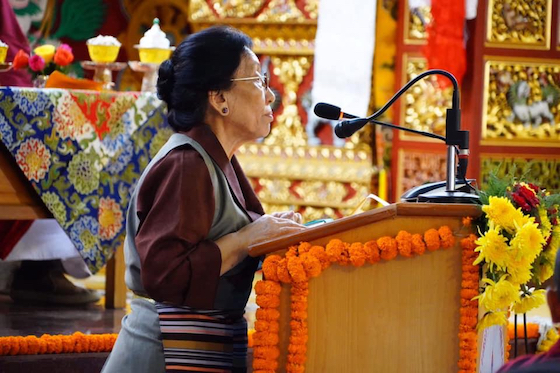
Rinchen Khando Choegyal, Founding Director and Special Advisor for the Tibetan Nuns Project, speaking at the special Sakya College for Nuns event in November 2019.
The event included a grand reception for His Holiness the 42nd Sakya Trizin, Ratna Vajra Rinpoche. The Sakya Trinzin (meaning “Throne-Holder”) is the traditional title of the head of the Sakya school of Tibetan Buddhism.
There were prayers and a mandala offering (mandal tensum) to His Holiness by H.E. Dungse Asanga Rinpoche and Khenchen Sonam Gyatso, the Director of the Sakya College for Nuns.
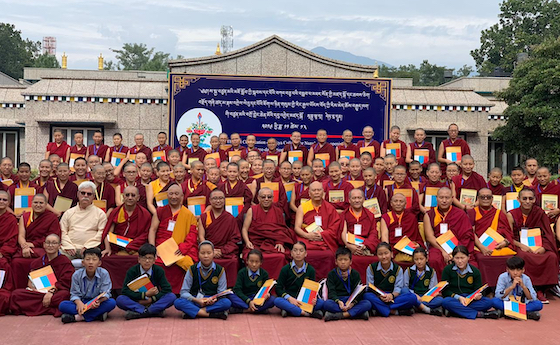
Participants with various observer invitees at the special convocation and seminar at Sakya College for Nuns in November 2019.
Speeches included an address by Choepa Dechen Wangmo Acharya, the Principal of the Sakya College for Nuns; a lecture on the “Evolution of Epistemology” by the Venerable Khentrul Khorchag Rinpoche; and speeches by Rinchen Khando Choegyal, Nangsa Choedon, and Dr. Kurt J. Schwalbe.
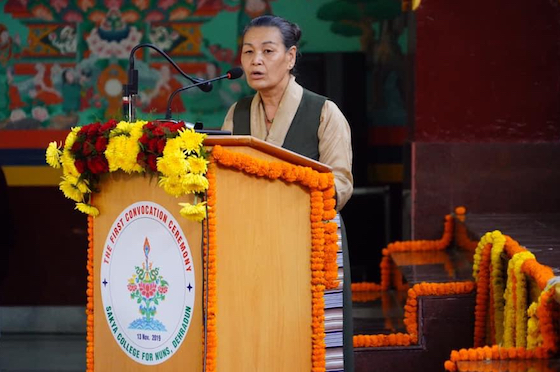
Nangsa Chodon, Director of Tibetan Nuns Project in India, speaking at the Sakya College for Nuns.
Following the presentation of the Kachupa Degrees to the graduating students by His Holiness the 42nd Sakya Trizin Ratna Vajra Rinpoche, there was a speech by His Holiness and concluding prayers.
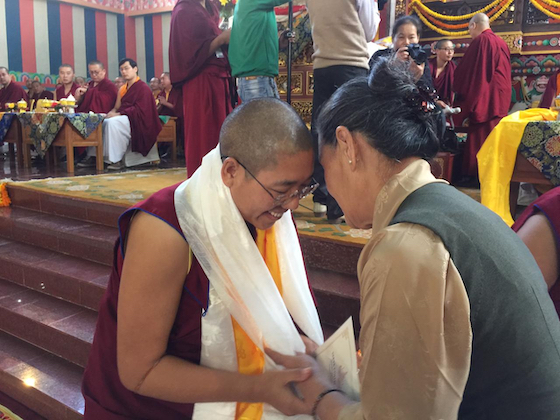
Nangsa Chodon, Director of Tibetan Nuns Project in India, congratulates one of the seven graduates who earned her Kachupa Degree at the Sakya College for Nuns.
Sakya College for Nuns in the Media
On December 3, 2019, VOA Tibetan did this 15-minute video interview and story in Tibetan about the convocation at the Sakya College for Nuns. Can’t see the video? Click here.
About the Sakya College for Nuns
The Sakya College for Nuns was established to train nuns in higher Buddhist philosophical studies. It is the only Sakya nunnery outside Tibet.
Surrounded by forests, the Sakya College for Nuns is located in Manduwala, about 12 miles from Dehradun and a few kilometers from the Palace of His Holiness the Sakya Trizin.

Tibetan Buddhist nuns studying at the Sakya College for Nuns
In 1993, a first small group of nuns arrived from Tibet and were housed near the monastery. This group quickly grew and the need for a permanent nunnery become a pressing issue.
Khen Rinpoche Gyatso believed it was essential to provide equal educational opportunity to nuns as well as monks. His Holiness the Sakya Trizin completely supported this idea and wished for a nunnery to be built for the Sakyapa nuns.
The Sakya nunnery was officially established in 1998 with His Holiness’ blessings and the Sakya College for Nuns was inaugurated on September 26, 2009. It has ushered in a new era for Sakya nuns. It is now home to 59 nuns who are supported through the Tibetan Nuns Project sponsorship program.
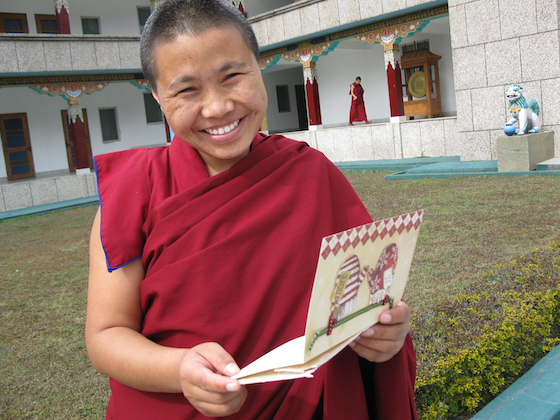
Tibetan Buddhist Nun at Sakya College for Nuns holding card from her sponsor. The Sakya College for Nuns is one of seven Tibetan nunneries in India supported through the Tibetan Nuns Project sponsorship program. People can sponsor a nun for $1 a day and help provide all the nuns with food, education, shelter, clothing, and medical care.
Some nuns come from Nepal, Bhutan, and the neighboring Himalayan regions. Most nuns, however, come from Tibet and have left behind their families and friends. To escape into exile, many Tibetan nuns faced a dangerous journey through difficult mountain passes on foot. Now the Sakya College for Nuns is their home and it is almost impossible for them to return, or even visit Tibet.
Now, for the first time, the Sakya nuns can engage in higher Buddhist studies at a dedicated facility and earn the highest degrees in the Sakya tradition. It provides a welcoming and nurturing environment where nuns can study and practice the core of Buddhist teachings.
Education at Sakya College for Nuns
The curriculum at the Sakya College for Nuns is based on the 18 classical texts which are traditionally studied at the Sakya monastic colleges.
The curriculum of the Buddhist Institute offers 6 main areas of Buddhist studies, which encompass both the Buddhist philosophical view and the stages on the path. They are 1. Logic 2. Abhidharma 3. Vinaya 4. Prajnaparamita 5. Madhyamika 6. Three Sets of Vows. Providing an opportunity for nuns to study these subjects is important for them to be able to teach others and for their own practice.
As the nuns advance through their studies, for the first time in the history of Tibet they are able to earn the following series of degrees:
Kachupa Degree: after 8 years of study
Lopon Degree: after 10 years of study
Rabjampa Degree: Those who complete 12 years of study, including an examination and the composition and defense of an original thesis, will be awarded the Rabjampa degree.
Ngagrampa Degree: After 14 years of study, including two years of tantra
Khachodma or Machigma Degree: In the 15th year of study, the nuns go on retreat to attain this degree.
Geshema Degree: Finally, after at least 15 years of study and four years of exams, the nuns are able to receive the highest degree, the Geshema Degree, equivalent to a Ph.D. in Tibetan Buddhist philosophy.
